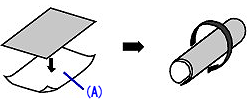Paper Is Smudged/Printed Surface Is Scratched
28-Aug-2008
8200271800
Issue
- Paper Is Smudged

(A) The Edges of paper are Smudged
(B) Printed Surface Is Scratched
- Printed Surface Is Scratched
Cause and Solution
- Check to see if the paper you are printing on is suitable for your printing purpose. -> "Media Types You Can Use"
When performing Borderless Printing, make sure that the paper you are using is suitable for Borderless Printing. If the paper you are using is not suitable for Borderless Printing, the print quality may be reduced at the top and bottom edges of the paper. ->"Printing Area"
- For Plain Paper
Turn the paper over and reload it to print on the other side.
Leaving the paper loaded on the Rear Tray for a long time may cause the paper to curl. In this case, load the paper with the other side facing up. It may resolve the problem.
We recommend putting unused paper back into the package and keeping it on a level surface.
- For Other Paper
1. With the printing side (A) facing up, cover the paper with a fresh sheet of plain paper to avoid staining or scratching the surface.
2. Roll up the paper in the opposite direction to the paper curl as seen below.

3. Check to see that the paper curl is within approximately 0.08 to 0.2 inches / 2 to 5 mm (C) in height.

(B) printing side
(C) approximately 0.08 to 0.2 inches / 2 to 5 mm
We recommend printing curl-corrected paper one sheet at a time.
NOTE
- Depending on the media type, the paper may be smudged or may not be fed properly even if it is not curled. In such cases, follow the procedure described above to curl the paper before printing. This may improve the print result.
Selecting the Prevent paper abrasion setting will widen the clearance between the Print Head and the loaded paper. If you notice abrasion even with the media type set correctly to match the loaded paper, set the machine to prevent paper abrasion by using the Operation Panel or the printer driver.
Print speed is reduced if you are selecting the Prevent paper abrasion setting.
* Deactivate the Prevent paper abrasion setting once printing is complete. If not, this setting remains enabled for all subsequent print jobs.
- To set by using the Operation Panel
From the HOME screen, select Settings, Device settings, and Print settings in this order, and then set Prevent paper abrasion to ON.
- To set by using the printer driver

Open the printer properties dialog box, and in Custom Settings in the Maintenance sheet, select the Prevent paper abrasion check box, and then click Send.

In the Canon IJ Printer Utility, select Custom Settings in the pop-up menu, select the Prevent paper abrasion check box, and then click Send.
Check 5: If the intensity is set high, reduce the Intensity setting in the printer driver and try printing again.
If you are using plain paper to print images with high intensity, the paper may absorb too much ink and become wavy, causing paper abrasion.
- When printing from your computer
Reduce the Intensity setting in the printer driver and try printing again.

1. Open the printer properties dialog box.

* Before clicking here to open the printer properties dialog box, quit the running application software.
2. On the Main sheet, select Manual for Color/Intensity, and then click Set.
3. Drag the Intensity slide bar on the Color Adjustment sheet to adjust the intensity.

1. Open the Print dialog box.
2. Select Color Options in the pop-up menu.
3. Drag the Intensity slide bar to set the intensity.
If you are printing beyond the recommended printing area of your printing paper, the lower edge of the paper may become stained with ink.
Resize your original document in your application software. -> "Printing Area"
Clean the Platen Glass.
Clean the Paper Feed Roller. -> "Cleaning the Paper Feed Roller "
NOTE
- Cleaning the Paper Feed Roller will wear the roller, so perform this procedure only when necessary.
When performing duplex printing, the inside of the machine may become stained with ink, causing the printout to become smudged. Perform the Bottom Plate Cleaning to clean the inside of the machine. -> "Cleaning the Inside of the Machine (Bottom Plate Cleaning)"
NOTE
- To prevent the inside of the machine from stains, set the paper size correctly.
Doing so gives the printed surface enough time to dry so that paper smudged and scratched are prevented.

1. Make sure that the machine is turned on.
2. Open the printer properties dialog box.
3. Click the Maintenance tab and then Custom Settings.
4. Drag the Ink Drying Wait Time slide bar to set the wait time, and then click Send.
5. Confirm the message and click OK.

1. Make sure that the machine is turned on.
2. Open the Canon IJ Printer Utility.
3. Select Custom Settings in the pop-up menu.
4. Drag the Ink Drying Wait Time slide bar to set the wait time, and then click Send.
5. Confirm the message and click OK.
Depending on the media type, the paper may be scratched by other loaded paper when feeding from the Rear Tray. In this case, load one sheet at a time.